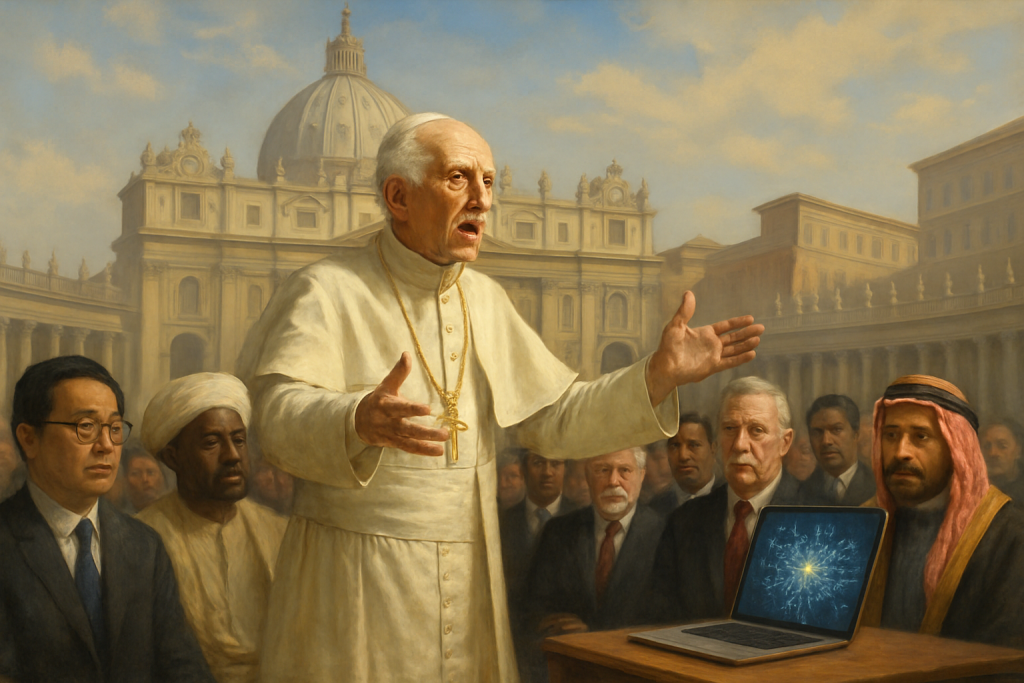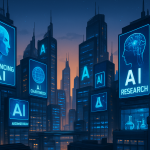The year is 2025. Flying cars are still just a glimmer in Elon Musk’s eye, but artificial intelligence? That’s very much here. And it’s on the mind of one very important person: Pope Leo.
In a scene straight out of a Dan Brown novel, but with less running through catacombs and more thoughtful discourse, Pope Leo addressed an international gathering of 68 parliamentary delegations and Italian Prime Minister Giorgia Meloni yesterday. The topic? The looming shadow, or perhaps the bright promise, of AI. The location? Vatican City, of course, a place where tradition and the future often find themselves in a fascinating, and sometimes tense, dance.
The Pope’s message, delivered with the gravitas you’d expect from the leader of the Catholic Church, wasn’t a fire-and-brimstone condemnation of AI. Instead, it was a call for careful consideration, a plea for humanity to retain control in a world increasingly shaped by algorithms. He emphasized that AI should be a tool for the betterment of humankind, not a force that diminishes or replaces us. Think less Skynet, more Rosie the Robot, but with a healthy dose of ethical oversight.
But why is the Pope weighing in on AI? It’s a fair question. The Catholic Church, after all, has a long history of grappling with technological advancements, from the printing press to the internet. This isn’t just about Luddite fears; it’s about deeply held beliefs about human dignity, purpose, and the very nature of existence. It’s about ensuring that technology serves humanity, not the other way around. The Church, in its own way, is asking the same question that sci-fi writers have been exploring for decades: what does it mean to be human in an age of increasingly intelligent machines?
The Pope’s concerns centered around AI’s potential impact on younger generations. He cautioned against the allure of AI solutions that might erode the development of crucial human skills and values. He highlighted the difference between AI’s “static memory” and the “creative, dynamic” nature of human memory. It’s a point worth pondering: can an algorithm truly replicate the nuances of human experience, the messy, unpredictable beauty of a life lived?
Think about it. AI can generate text, compose music, even create art. But can it truly understand the heartbreak of a lost love, the joy of a child’s laughter, the quiet satisfaction of a hard day’s work? Can it learn to truly empathize? Or is it simply mimicking patterns, regurgitating data without genuine understanding? The Pope’s message is a reminder that human experience is more than just data points; it’s about the messy, beautiful, and sometimes painful process of becoming.
Italian Prime Minister Giorgia Meloni, standing shoulder to shoulder with Pope Leo, echoed his concerns. She pledged Italy’s commitment to ensuring that AI development remains human-centered and ethically governed, both within Italy and on a global scale. This is significant. It suggests a growing awareness among political leaders that AI isn’t just a technological issue; it’s a societal one, a political one, an ethical one. It requires careful regulation, thoughtful planning, and a commitment to ensuring that AI benefits all of humanity, not just a select few.
Meloni’s commitment is crucial, but the devil, as they say, is in the details. How will Italy, and the international community, actually translate these principles into concrete policies? What safeguards will be put in place to prevent AI from being used to exploit workers, manipulate elections, or exacerbate existing inequalities? These are the questions that policymakers must grapple with in the coming years.
The Jubilee Context
This papal address took place within the context of the Roman Catholic Jubilee, a significant event in the Church’s calendar. Jubilees are traditionally times of forgiveness, reconciliation, and renewal. In this context, the Pope’s focus on AI takes on an added layer of meaning. It’s a call for humanity to reconcile with its own technological creations, to ensure that they serve our highest aspirations, not our basest instincts. It’s a chance to renew our commitment to human dignity and the common good in an age of rapid technological change.
Pope Leo’s Consistent AI Focus
Since assuming the papacy in May 2025, Pope Leo has consistently highlighted AI as a recurring theme in his commentary. This isn’t a passing fancy; it’s a deep-seated concern. He clearly sees AI as one of the defining challenges of our time, a force that could either uplift humanity or lead us down a dangerous path. His consistent advocacy for responsible AI use suggests a long-term strategy to shape the global conversation around this transformative technology.
The Broader Implications
The Pope’s intervention raises several crucial questions. What role should religious institutions play in shaping the development of AI? Should moral and ethical considerations be at the forefront of AI research and development, or should technological progress be the primary driver? How can we ensure that AI reflects the values of diverse cultures and communities, rather than simply replicating the biases of its creators? These are complex questions with no easy answers, but they are questions that we must grapple with if we want to create a future where AI serves humanity, not the other way around.
The financial implications are also significant. The AI industry is already a multi-billion dollar market, and it’s poised for explosive growth in the coming years. The Pope’s call for ethical AI development could influence investment decisions, consumer behavior, and government regulations. Companies that prioritize ethical considerations may find themselves at a competitive advantage, while those that ignore these concerns may face reputational damage and regulatory scrutiny.
Ultimately, Pope Leo’s address is a reminder that AI is not just a technological challenge; it’s a human one. It’s about our values, our priorities, and our vision for the future. It’s about ensuring that technology serves humanity, not the other way around. And it’s about creating a world where everyone has the opportunity to thrive, regardless of their technological abilities. The next chapter of the AI story is being written now, and it’s up to all of us to ensure that it’s a story worth telling. It is as if the Pope is channeling his inner Morpheus from The Matrix and is giving the world a choice: red pill or blue pill. To embrace AI blindly, or to approach it with cautious optimism and a heavy dose of ethical consideration.
Discover more from Just Buzz
Subscribe to get the latest posts sent to your email.


